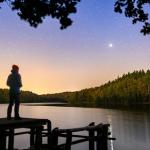 Scot put up an interesting post yesterday Among Creationists commenting on a book Among the Creationists: Dispatches from the Anti-Evolutionist Front Line by Jason Rosenhouse. The impact that creationism with its focus on a culture war has within the church and outside the church is huge. We need to open a serious discussion of the issues – and it needs to happen within the church. But it is unclear to many how to even begin to start a fruitful conversation – especially given the background and training of most Christian leaders, both lay leaders and clergy.
Scot put up an interesting post yesterday Among Creationists commenting on a book Among the Creationists: Dispatches from the Anti-Evolutionist Front Line by Jason Rosenhouse. The impact that creationism with its focus on a culture war has within the church and outside the church is huge. We need to open a serious discussion of the issues – and it needs to happen within the church. But it is unclear to many how to even begin to start a fruitful conversation – especially given the background and training of most Christian leaders, both lay leaders and clergy.
In the post today I would like to highlight a new resource, a feature-length documentary by Highway Media, The Biologos Foundation, and Ryan Pettey, titled From the Dust. The film premiered in Palo Alto on May 31, and is now available for purchase from Highway Media, ($20 DVD, $25 Blu-Ray)
Although Palo Alto was a bit too far to travel and I was unable to attend the premiere, I was sent a copy of the film and have watched it a couple of times. It is an excellent resource for use in churches and by parachurch organization, especially campus ministries. A review of the film can also be found on Pen and Parchment Blog.
What do you think we need to start a useful conversation?
Who do you think needs to be involved?
The subtitle of From the Dust is “conversations in creation” and this subtitle reflects the primary purpose of the film. The aim is to start a conversation and to open minds to the issues involved in the questions of evolution and creation, but to do so in a fair fashion. I don’t mean that the film takes no position on the issue – the film clearly intends to make a case for evolutionary creation as consistent with the Christian faith, and in fact as the preferred option. But it does so without misrepresenting or vilifying those holding alternative views. It includes interviews with and footage of young earth creationists from AiG, the Creation Museum, and Canopy Ministries, allowing them to explain in their own words the key issues in creationism from their perspective. Dr. Jason Lisle of Answers in Genesis provides a significant part of this perspective. Dr. Terry Mortenson of Answers in Genesis contributes as well – and the footage involving Mortenson illustrates the culture war view point observed by Rosenhouse and common among at least some who champion young earth creationism.
The majority of the film, however, features scientist, theologians, and biblical scholars who reflect on the way evolutionary creation is or can be consistent with Christian faith. Because many of the questions concern the authority and reliability of scripture, especially the book of Genesis, a significant emphasis is placed on looking at the interpretation of scripture and the role it plays, or should play, in the discussion of evolution and creation. The film includes Peter Enns, John Walton, N. T. Wright, John Polkinghorne and several others discussing the nature of scripture.
To highlight just one contribution – John Walton, Professor of Old Testament at Wheaton College, notes (about 18 minutes in to the film):
“We have to approach Genesis One for what it is. It is an ancient document. It is not a document that is written to us. We believe the bible is written for us like it is for all people in all times and places because it is God’s word, but it wasn’t written to us. It wasn’t written in our language, it wasn’t written with our culture in mind, or our culture in view.” … “We are inclined by our culture to think of the creation narrative as an account of material origins, because we think of the world in material terms. For us that’s kind of whats important about origins. People come to scripture thinking that they need to integrate it with science and so they want to either read science out of the bible or they want to read science into the bible. That’s not the way to do it, because inevitably you end up making the text say things that it never meant to the ancient audience.”
… (23 minutes) “We’re well aware that people have to translate the language for us. We forget that people have to translate the culture for us. And therefore if we want to get the best benefit from the communication we need to try to enter their world, hear it as the audience would have heard it, as the author would have meant it, and to read it in those terms.”
You can also see an excerpt somewhat longer than the final cut including these comments by Walton on the BioLogos site: The Book of Genesis. Walton’s comments reflect the ideas found in his book The Lost Worlds of Genesis One.
From the Dust is designed to be a conversation starter, not a source for answers to all questions. The film is about 66 minutes long and the DVD contains another 60 minutes of bonus footage, interviews and excerpts grouped by topic that did not make the final cut. The film can be ordered from highway media and will make an excellent resource for churches and parachurch organizations, especially campus ministries, interested in exploring the issues and opening a conversation.
I think the film will work best when followed by open discussion over several sessions, preferably led by Christians with expertise in science and theology. This is something I hope to be able to do as opportunities present themselves, but there are many scholars and teachers around the country capable of leading the discussion. It isn’t enough to simple select your resident scientist or scholar, however. I cringe when I recall some of the things I thought, and occasionally said, when I first began to explore the issues in earnest. This isn’t a conversation that will move forward without wise leadership and direction from those who have thought carefully and deeply about the issues.
But there is more … From the Dust is an excellent complement to another recent film, Test of Faith, put out by the Faraday Institute. From the Dust concentrates primarily on the questions of creation, scripture, and the church. Test of Faith covers these issues briefly but broadens the discussion to include a number of other issues of importance in the interaction between science and the Christian faith.
Part 1 of Test of Faith looks at the Big Bang and the age of the Universe, Part 2 looks at creation and design, and Part 3 considers questions about humanity – does science prove that humans no more than biological machines? This last part explores some very interesting questions – one brief example:
The DVD contains three ca. 30 minute episodes plus bonus footage grouped by topic and bonus interviews of the scientists featured in the film. I have watched the video and find it an outstanding resource. The course includes the DVD, a study guide, a leader’s guide, and a book of Spiritual Journeys with Scientists.
As with From the Dust, the Test of Faith course will work best if led by Christians with expertise in science and theology, who have thought about the issues and are prepared for the discussion. Again, this is something I hope to be able to do as opportunities present themselves, but there are many scholars and teachers around the country capable of leading the discussion. The Test of Faith material, however, is designed to be used by a broad group. The Leader’s Guide provides a great deal of useful information and guidance and can be used by leaders and teachers who are interested but perhaps not deeply involved in this discussion themselves.
I can recommend a dozen books, or more, and in fact I have – see the Science and Faith archive for a bibliography. But video presentations like From the Dust and Test of Faith are much better resources to open the discussion, to get people talking and interested in the questions. I recommend both without reservation.
Is there space and interest to start this conversation in our church today?
Is it an issue worth raising, or a controversial topic best left buried and ignored?
What do you see as the primary issues and questions?
If you would like to discuss how these resources or others could be used in a local church or campus ministry, or to contact me directly with other comments or questions, you may do so at rjs4mail[at]att.net.
If interested you can subscribe to a full text feed of my posts at Musings on Science and Theology.















